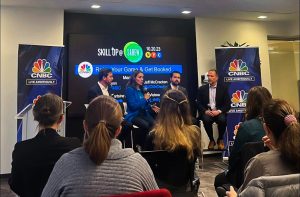
“Don’t be boring.” This isn’t just a consistent theme of my posts here but what the Washington Post’s incoming owner, Jeff Bezos, told the staff. “Rule No. 1 is: Don’t be boring.” If the Amazon.com billionaire walks the walk, the Post will enjoy a renaissance.
Newspapers have been getting boring for the past two decades. For many corporate owners and bosses, boring — especially boring business journalism — has its charms: No angry phone calls from powerful corporate viziers, no campaigns to, “fire Talton,” as I faced in Phoenix, and no brain damage from dealing with disagreeable readers. Just move across the water without making waves. Unfortunately, this has led to a bleeding of readers and relevance.
My wife, Susan, loves newspapers. She will read a paper from start to finish, every story, comics, baseball standings, etc. She is the kind of reader we have abused for years as fads have been handed down to chase non-readers, people who will never buy the paper. Each new “initiative” carried a cost in dumbing down the paper, reducing coverage, dulling the edge, becoming boring. As a result, we have fewer people like her, who will read a mediocre report out of duty and habit, with a memory of better newspapers and the hope that occasionally actual journalism will be committed.
I suspect more readers are like me. I get my news from a cafeteria of sources, and most of them aren’t newspapers: Salon, Slate’s Matthew Yglesias, Naked Capitalism, New York Magazine, Matt Taibbi at Rolling Stone, Baseline Scenario, FT Alphaville, Felix Salmon, Heidi N. Moore at the Guardian, Economix and Catherine Rampell at the New York Times, Paul Krugman, the Diplomat, Talking Points Memo, trade expert Clyde Prestowitz, Ezra Klein’s brilliant Wonkblog, and dozens of others. Got an urban jones? There’s Urbanophile, Planetizen and DC Streets Blog among others. The same holds true for any specialty. My personal blog Rogue Columnist draws in thousands of readers from Phoenix (and all 50 states).
This is the competition. If a local business section can’t measure up, it is circling the drain. What do these rivals have in common? They offer exclusive and authoritative reports, unique takes on events, context you won’t find in the mainstream media, personality, attitude, edge. They’re not boring. Ignore this universe of offerings competing for your readers’ time at your peril. If you are a journalism student, you may end up working at outfits like these, or starting your own (having universal health care would help in kickstarting such entrepreneurship).
The good news is that local business journalism, rightly done, is a natural competitive edge. But it can’t be boring. The nicest compliments I have received come from people who say, “I never read the business pages before I found your column…” At the risk of repeating myself: Stories should anticipate the news, not react to it. If you’re forced to react, advance the story in a compelling way. Set a sexy news agenda instead of trying to chase every press release that comes across the tubes. Every story must have stakes: Conflict, something at risk, winners, losers, a ticking clock. This is not an invitation to “sensationalism.” It’s a way to not be boring. And yes, good graphics, photos and video can help, too. So can newsletters emailed to readers.
Every news organization should create a few destinations that readers can’t pass up. At the Charlotte Observer in the 1990s, we had the Insider, a local business gossip column appearing every week in Business Monday. Every reporter and editor contributed an item, heavy on personalities, talk-about-town and informed speculation, which I would write through in the voice of “the Big I,” a martini-imbibing busybody. At the Seattle Times now, we have Microsoft Pri0, written by Janet I. Tu, and Brier Dudley’s Blog, which focuses on technology. I do a daily online column, as well, with plenty of ‘tude (I’m trying to move away from the outdated term “blog”). With a modest sized staff, Business Editor Becky Bisbee has established several destinations that can effectively compete for readers every day. And these are readers from across the country (and world), not just locally. The Web allows people to break down geographic boundaries in search of the best content.
So Bezos gets it. At least I hope so. Remember rule No. 1. If we can rediscover our roots, that the very definition of news is, well, new — then we’ll offer our best and can hope a new business model will catch up.











